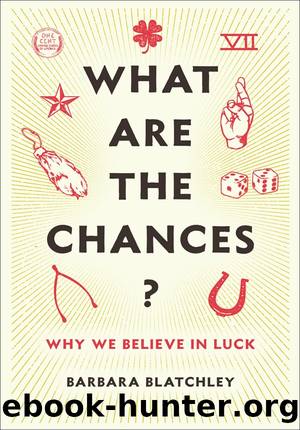What Are the Chances? by Barbara Blatchley

Author:Barbara Blatchley [Blatchley, Barbara]
Language: eng
Format: epub
Publisher: Columbia University Press
Published: 2021-08-03T00:00:00+00:00
LUCK AND PERSONALITY
I discussed attribution theory and what it had to say about those of us who believe in luck in chapter 3. Traditionally, believers were thought to have an external locus of control, using luck as an explanation for things that happened in their life that were unexpected, impossible to control, and unstable. The assumption was that nonbelievers were more rational, more likely to take probabilities into account, and considered their own talents and abilities when making attributions for unexpected events. In general, the traditional view in psychology has been that nonbelievers in luck are psychologically healthier than believers.
New research suggests that believers in luck might see luckiness as a personal characteristic, a part of their personality. People who see themselves as lucky seem to be using that belief to generate hope and confidence when faced with an unpredictable and random problem that needs to be solved. Luck may still be perceived as random and outside of our control, but seeing yourself as a lucky person might make that randomness easier to bear and help believers figure out what to do about that unpredictable event. In this view, belief in luck is associated with better mental health and stronger coping skills compared to people who believed they are unlucky.
The role of personality in luck is tricky to describe. The first hurdle is the need to define personality, and thatâs no easy task. Psychologists define personality as patterns in our thoughts, our emotional response, and our behaviors that make us unique.24 These characteristic ways of interacting with the world come from inside us. They can be modified through experience and often are, but theyâre a part of us in a way that learning how to sum numbers or conjugate verbs or memorizing dates in history are not. They are also fairly consistent across our entire lifeâthey donât suddenly change unless thereâs some drastic change in our brainâwitness poor Phineas Gage.
The ratio of theta to beta waves in our EEG is indicative of other aspects of our personality, including our attention strategies or the way we choose to allocate our attention to the array of things out there in the big wide world.25 Some of us exercise more control over our attention than do others, and our degree of control over attention is a stable, long-term aspect of our personality. Researchers have found that the theta/beta ratio tends to be negatively correlated with the degree of control a person has over attention. People with a lot of attentional control tend to have low theta/beta ratios, and vice versa.26 This aspect of our personality is related to the way the attention control system in the brain functions.
Another way that personality differs from person to person is in trait anxiety. Iâm sure youâve recognized that some people are more anxious than others; in fact, for some people, anxiety is a stable, defining aspect of their personalityâthatâs called trait anxiety. People with high levels of trait anxiety tend to see threats and danger in many situations.
Download
This site does not store any files on its server. We only index and link to content provided by other sites. Please contact the content providers to delete copyright contents if any and email us, we'll remove relevant links or contents immediately.
Spare by Prince Harry The Duke of Sussex(5197)
Machine Learning at Scale with H2O by Gregory Keys | David Whiting(4313)
Fairy Tale by Stephen King(3399)
Will by Will Smith(2920)
The Bullet Journal Method by Ryder Carroll(2573)
Hooked: A Dark, Contemporary Romance (Never After Series) by Emily McIntire(2555)
It Starts With Us (It Ends with Us #2) by Colleen Hoover(2367)
Rationality by Steven Pinker(2366)
Can't Hurt Me: Master Your Mind and Defy the Odds - Clean Edition by David Goggins(2342)
Friends, Lovers, and the Big Terrible Thing by Matthew Perry(2230)
The Becoming by Nora Roberts(2203)
Love on the Brain by Ali Hazelwood(2078)
A Short History of War by Jeremy Black(1848)
HBR's 10 Must Reads 2022 by Harvard Business Review(1845)
The Strength In Our Scars by Bianca Sparacino(1844)
A Game of Thrones (The Illustrated Edition) by George R. R. Martin(1746)
Leviathan Falls (The Expanse Book 9) by James S. A. Corey(1745)
515945210 by Unknown(1667)
Bewilderment by Richard Powers(1621)
